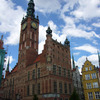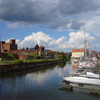The Invasion of Poland, September 1939
Each country has its own way of remembering the fallen in battle. In Poland, the most moving remembrance of the dead takes place on November 1st, All Souls Day, when cemeteries across the country are lit up by seas of candles. It is an extraordinary sight. Memorials to the unknown soldier are flooded with candles, whilst all about one stumbles across the tombs of those who had been wrenched from their homes by war, never to return.
However, the advent of war itself receives its own acknowledgment, and it is appropriately stark for a country that lost a fifth of its population during the last war. At midday on the 1st September, a siren breaks out in cities across Poland. It is a noise that transports the listener right back to the madness of the war years.
The first shots of the Second World War were fired at Gdansk from the German battleship Schleswig-Holstein on 1st September 1939 - the ship had supposedly been moored on a friendly visit. The invasion then began apace, and it was launched on several fronts. Poland's allies watched (a fact that still arouses controversy) as the country was subjected to one of the fiercest bombing campaigns that had been witnessed in contemporary warfare. Whilst the Poles fought within their means, ultimately they were ill-equipped to stand against the German Wehrmacht alone.
Warsaw, Poznan and Lodz were systematically bombed and civilian casualties were huge. The capital lost fifty thousand alone, and large swathes of the city, including many of the most historic buildings, were annihilated or damaged. "The city resembled an overturned ant-heap," wrote one observer. " The streets were full of rubble, with pathways trodden here and there by the people who were hurrying about in all directions. "
Within weeks the country had been overrun, and on 28th September German forces marched into the capital. Meanwhile, huge numbers of Poles were fleeing east to avoid life under Nazi occupation. However, in an unsuspected twist, a rearguard invasion occurred that put paid to their efforts. Unbeknown to the Poles, the Germans had signed a covert pact with the Russians that agreed to divide up the spoils of the conquered country. On 17th September the Red Army entered eastern Poland. A surreal and bitter irony of the time was that as Poles swam across the River Bug in an attempt to avoid German occupation, others were crossing the same river to escape the Soviets. Neither fully comprehended the treachery of what was unfolding. As it was, Poland's agony was only just beginning.






